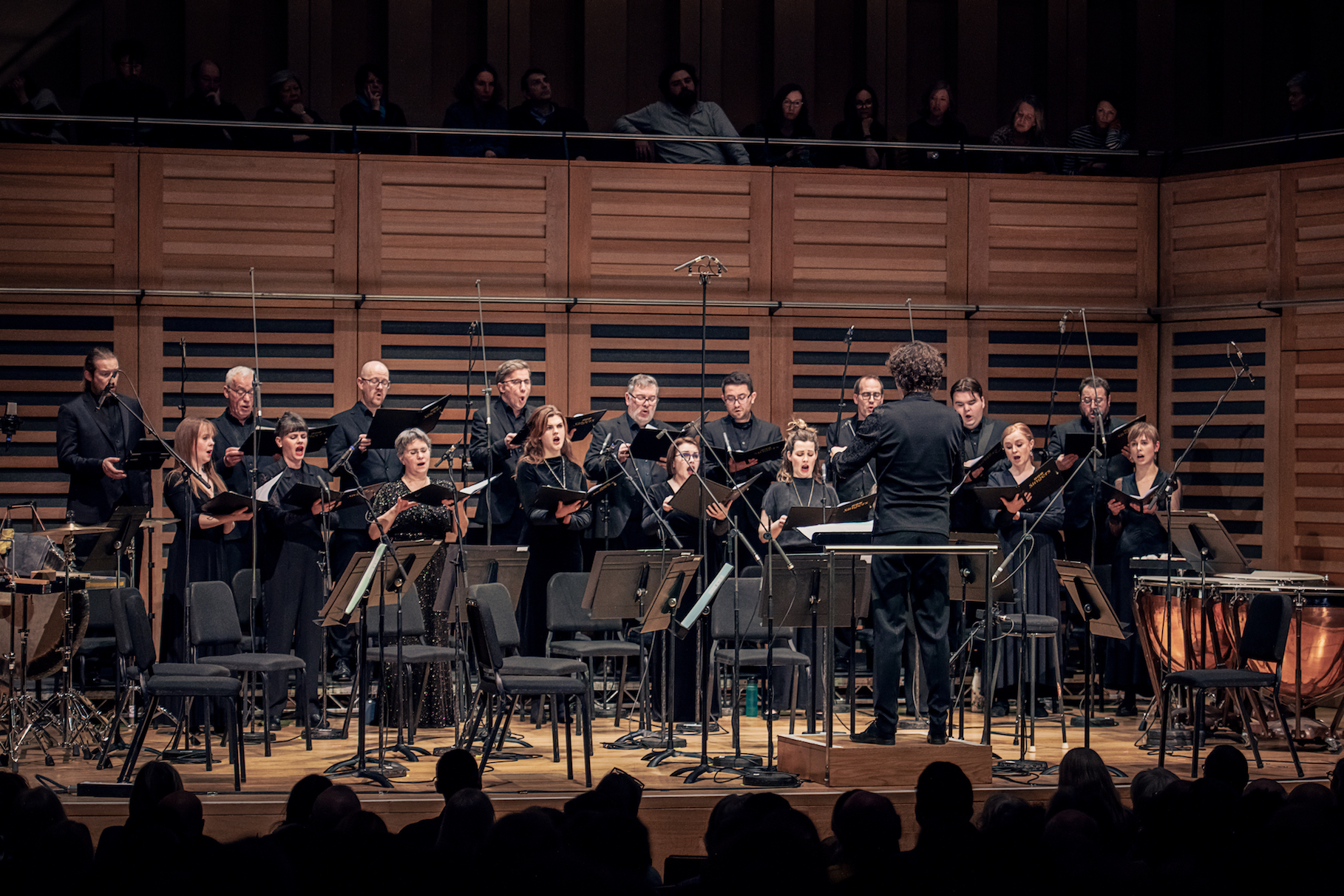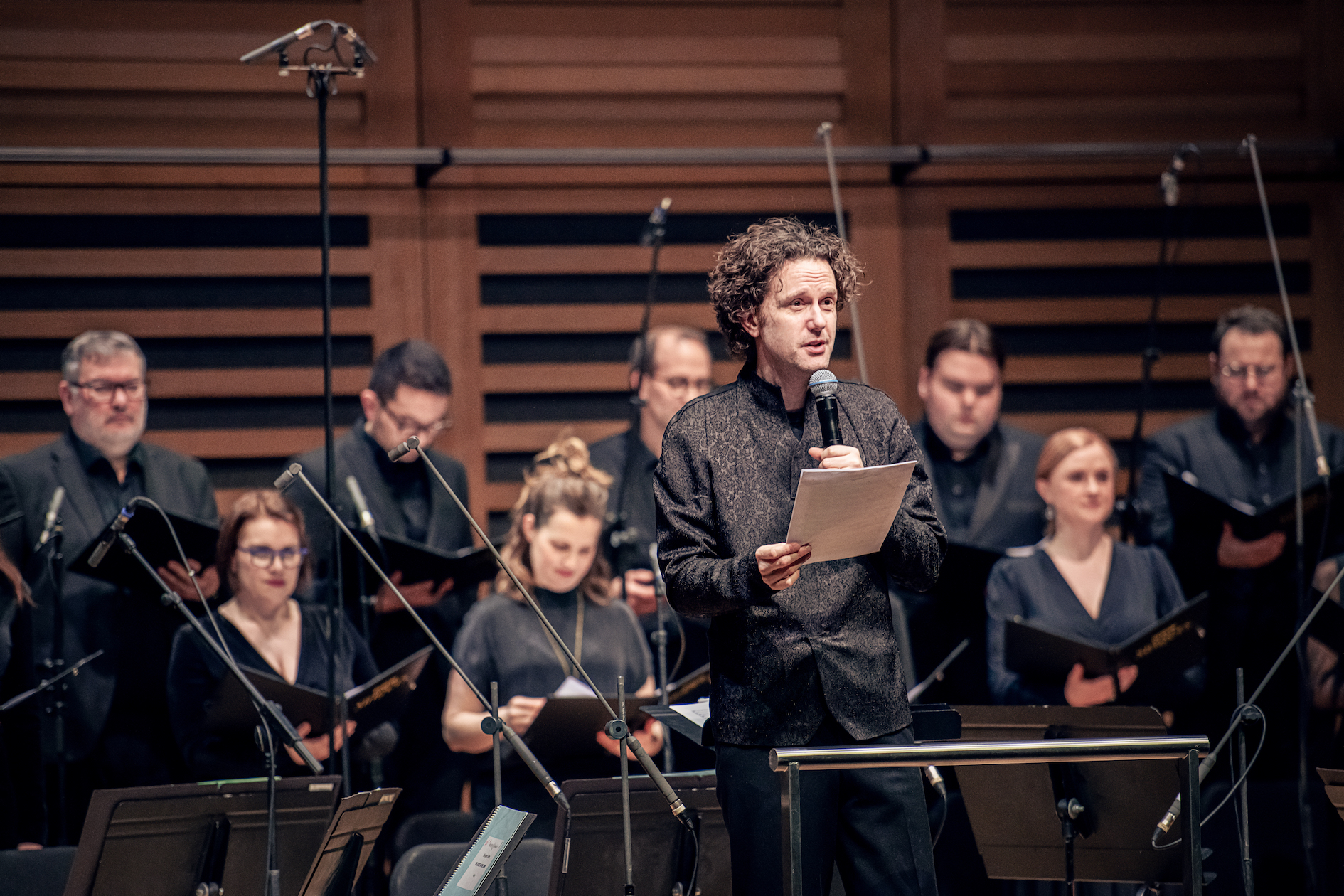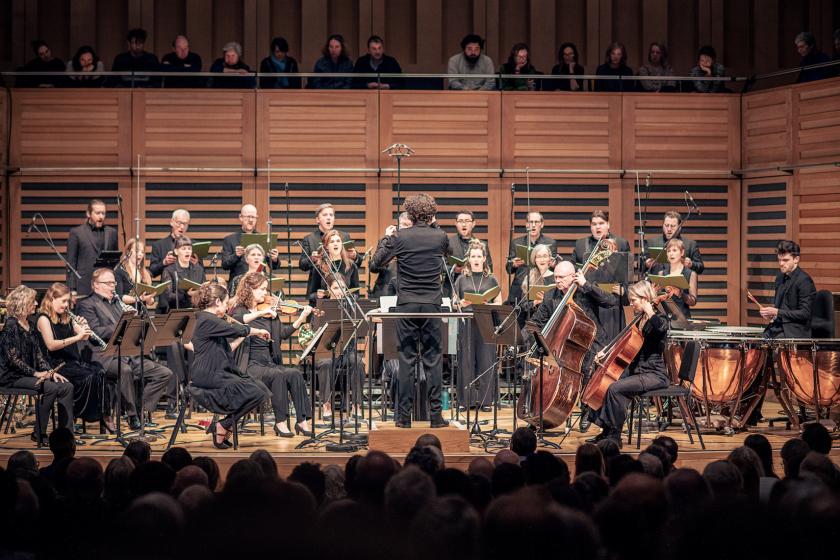Just now, music about survival, transcendence and the afterlife may have a special resonance for the BBC Singers. After all, the supremely versatile century-old chamber choir has endured its own near-death experience – at the hands of the BBC top brass who, in 2023, planned to axe them.
At Kings Place, with the Aurora Orchestra and its conductor Nicholas Collon, the Singers made a typically refined and resourceful contribution to a concert in the venue “Earth Unwrapped” strand. Sense and spirit merged in a programme that began with three a cappella numbers and concluded with the 1893, chamber-sized, version of Fauré’s Requiem: that evergreen glimpse of paradise on earth.
These intimate surroundings lent impact and immediacy to each item, even if – when the Aurora’s instrumentalists played in front of the choir – the solo voices projecting from behind occasionally struggled to stand out. No such issues bothered the first trio of unaccompanied pieces, varied in style but each sung with immaculate blend and balance. In Schütz’s brief motet “Selig sind die Toten” from 1648, a gentle, gracious humility begins to soar heavenwards on celestial high voices – and, inevitably, ascends towards the sound-world of Bach. As for Kim Porter’s much more recent “Your World”, which sets a poem by the Harlem Renaissance writer Georgia Douglas Johnson, its initially subdued, even anxious, harmonies gradually take wing into a richly affirmative, satisfying – and distinctly choir-friendly – vocal weave. (Porter herself sings with The Sixteen and, sometimes, with this ensemble too.) After which, an arrangement for 18 voices of the fugitive melancholy of Mahler’s “Ich bin der Welt abhanden gekommen”, from Rückert-Lieder, probed the singers’ ability to match, bar by bar, the bittersweet song’s quicksilver interplay of mezzo solo and accompaniment (in either its piano or orchestral versions). This was a stiff test that the Singers (pictured above) glided through with admirable finesse and agility – though, even in this acoustically involving hall, some of the granular detail proved hard to catch.
As for Kim Porter’s much more recent “Your World”, which sets a poem by the Harlem Renaissance writer Georgia Douglas Johnson, its initially subdued, even anxious, harmonies gradually take wing into a richly affirmative, satisfying – and distinctly choir-friendly – vocal weave. (Porter herself sings with The Sixteen and, sometimes, with this ensemble too.) After which, an arrangement for 18 voices of the fugitive melancholy of Mahler’s “Ich bin der Welt abhanden gekommen”, from Rückert-Lieder, probed the singers’ ability to match, bar by bar, the bittersweet song’s quicksilver interplay of mezzo solo and accompaniment (in either its piano or orchestral versions). This was a stiff test that the Singers (pictured above) glided through with admirable finesse and agility – though, even in this acoustically involving hall, some of the granular detail proved hard to catch.
Britten’s Rejoice in the Lamb – heard here in Imogen Holst’s arrangement for small orchestra rather than organ – sets lines from Christopher Smart’s eccentric and ecstatic 18th-century praise-poem Jubilate Agno (not “Deo” as the printed programme had it). The Aurora players captured all of the oddball charm, and startling originality, of Britten’s response to the vision of another defiant outsider, from the woodwind twists and leaps of “My Cat Jeoffrey” to the mock-heroic march of the Mouse (“a creature of great personal valour”). The choir, with solo passages, also has to master a set of nimble moves, as it shifts from the plainchant-like monody of the opening hymn to the stricken awe of the “Lament” and the soprano-led serenity of the closing hallelujah. Ensemble sections sounded terrific though, for this wonderfully quirky verse so deftly set, a bit more clarity would have been welcome on a few occasions. This choir’s pin-sharp diction is legendary; maybe the stage configuration might have muddied some lines.
Lost for almost a century, Faure’s 1893 version of the Requiem puts violas and cellos (four each) centre-stage in a mellow, woody chamber ensemble, more family chapel than echoing basilica. From the arresting crunch and bloom of the strings in the Introit onwards, this would clearly be a performance in which the instrumentalists declined to play second fiddle.  However, Collon’s brisk, poised and distinctly schmaltz-free direction meant that, in this work, choir and orchestra achieved a lovely equilibrium. This chamber-scaled Requiem never felt underpowered. With these forces, the tender fervour of Fauré’s thoroughly undogmatic quest for post-mortem transcendence had every chance to shine. The soloists brought lucidity, warmth and feeling to their limelight moments: bass Jamie W Hall in the Offertory and Libera Me; soprano Rebecca Lea in the Pie Jesu. If the violas and cellos often starred at the front, the horns (Annemarie Federle and Jo Withers) aced their decisive moments in the Sanctus and Agnus Dei. Meanwhile – up in the gallery – the solo violin of Alexandra Wood led us angelically, but never wispily, in the direction of paradise.
However, Collon’s brisk, poised and distinctly schmaltz-free direction meant that, in this work, choir and orchestra achieved a lovely equilibrium. This chamber-scaled Requiem never felt underpowered. With these forces, the tender fervour of Fauré’s thoroughly undogmatic quest for post-mortem transcendence had every chance to shine. The soloists brought lucidity, warmth and feeling to their limelight moments: bass Jamie W Hall in the Offertory and Libera Me; soprano Rebecca Lea in the Pie Jesu. If the violas and cellos often starred at the front, the horns (Annemarie Federle and Jo Withers) aced their decisive moments in the Sanctus and Agnus Dei. Meanwhile – up in the gallery – the solo violin of Alexandra Wood led us angelically, but never wispily, in the direction of paradise.
The choir sounded mighty, and mightily together, when the big moments required, but properly mesmerising as well in the hush of softer moods. Collon too (pictured above) deserves hosannas for delicate dynamics that wrought telling effects from relatively small changes of emphasis and volume. Convincing accounts of the Requiem have to draw a firm line between (necessary) sentiment and (superfluous) sentimentality. On its way to heaven via King's Cross, this one did.














Add comment